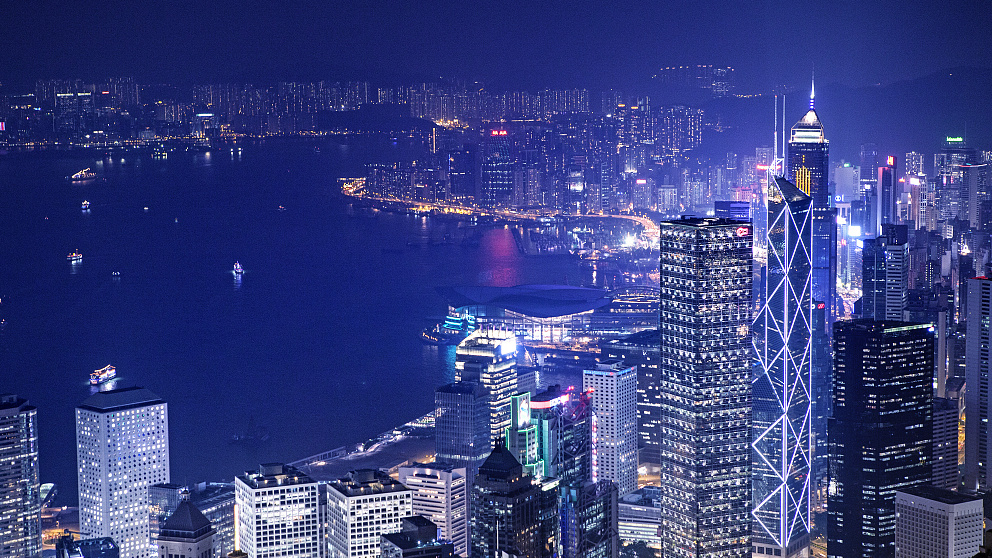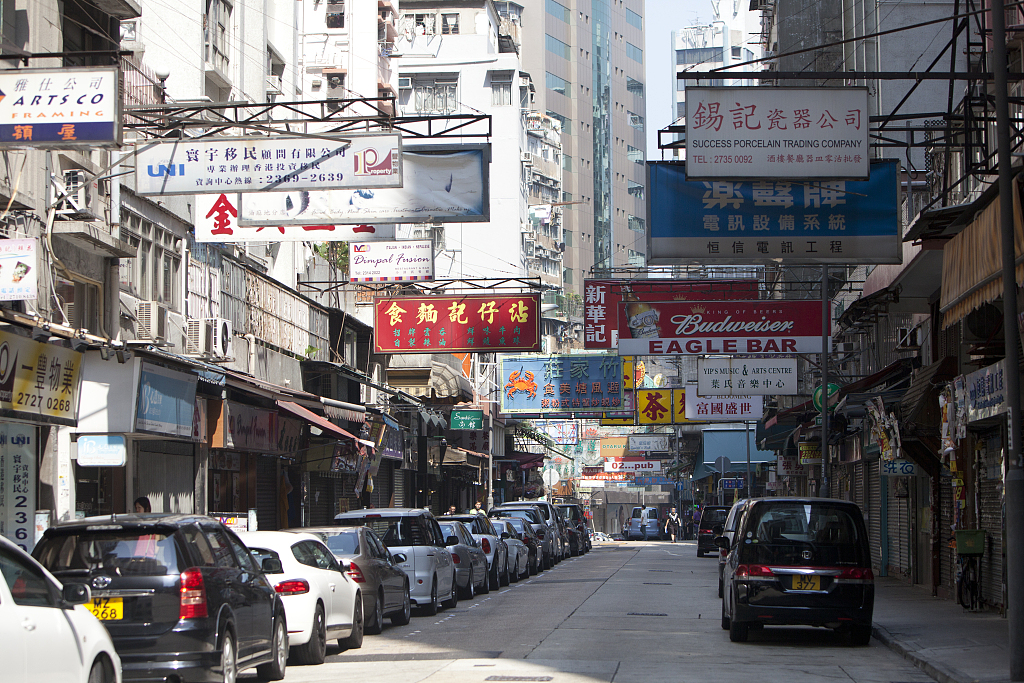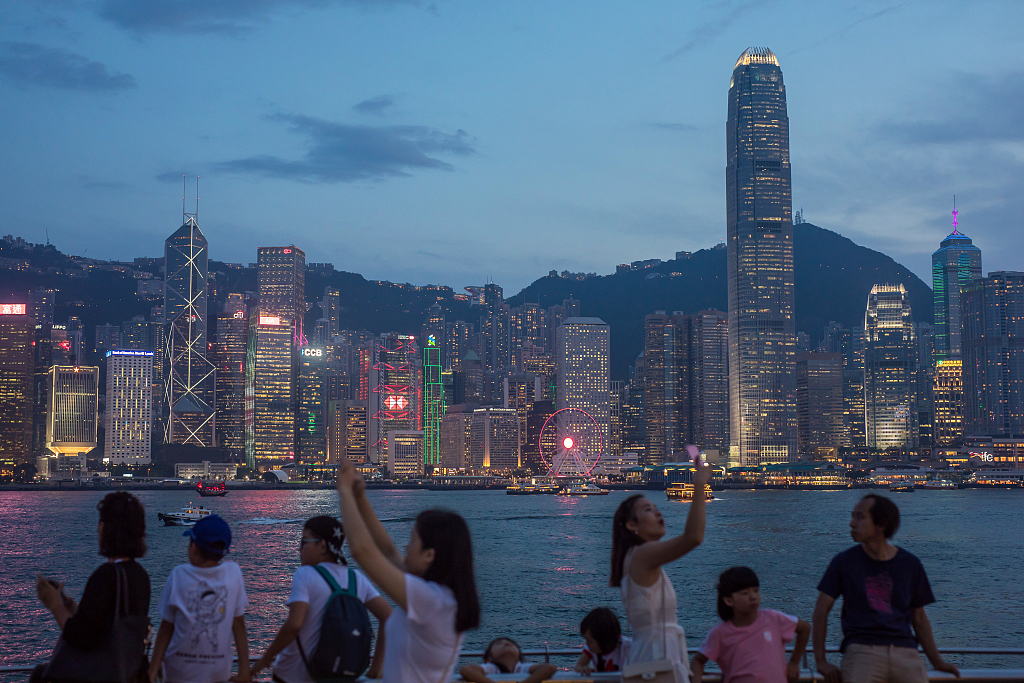

Editor's note: Djoomart Otorbaev, former prime minister of the Kyrgyz Republic, Non-Resident Senior Fellow of Chongyang Institute for Financial Studies, Renmin University of China. The article reflects the author's opinion, and not necessarily the views of CGTN.
A quite sad observation: large protests in Hong Kong are in their 12th week.
These unprecedented waves of protests raise an important question. Why it is happening? Are the protests against the fugitive bill or the foreign intervention? Or are they about democracy or the economics?
My interpretation of the current situation is quite straightforward. The main and fundamental reason of the crisis is an economic one. The Hong Kong Special Administrative Region (SAR) is gradually but continuously losing its competitiveness to other regions of China, especially to its neighbors. The process has significantly accelerated in last couple of years.
The vast majority of angry young people who take to the streets are mainly disappointed with their lives as their incomes cannot keep up with the stellar growth of living costs, and they see no hope for their future.
With that, many wrongfully think that the introduction of a "Western-style" democracy is the only solution. While the truth is their actions will only make the situation even worse.

A street in Hong Kong, China, October 23, 2012. /VCG Photo
So far Hong Kong has played and enjoyed a critical role as a bridge between the Chinese mainland and the Western world, especially in trade and finance. For quite some time it has been a role model for the rest of the country in economic development, especially in the services sector. Unfortunately, it's not any more.
Indeed Hong Kong's position is truly unique. It has the third-busiest airport in the world, handling nearly 80 million passengers annually and serving as a huge logistics hub for global shipping. Hong Kong is serving as one of the main financing centers of Asia, and will have a special status in development of the Belt and Road Initiative. Sadly, the protests have interrupted that.
While the Chinese mainland accelerates the progress in its reform and opening-up, Hong Kong's economy is fundamentally decelerating.
Besides, it is getting more clear that Hong Kong has been losing its competitive advantages to China's other regions, for example, its neighbor, Shenzhen, particularly in scientific and technological innovation.
According to the Caixin media company report, economic output by the science and technology innovation sector in Hong Kong accounted for only 0.7 percent of its GDP, employing only about 40,000, which is less than 1 percent of the total employment in the country in that sector.
Relying only on its historic superiority as an exclusive link between the Chinese mainland and the West, instead of making in-depth reforms, Hong Kong has brought its economic growth to stagnation, and made it weaker.
Protests make the situation much worse. Up to now more than 20 countries have released tourism warnings for Hong Kong. Data showed that trips made to Hong Kong increased by 150 percent year on year in the first five months of 2019, yet the growth rate decreased to 8.5 percent in June.
As Bloomberg reported recently, more than 600 billion U.S. dollars of stock market value has disappeared from the exchanges since early July.
Serious damage to the whole services sector, to retail and tourism industries also means a significant loss of jobs for local residents.

Tourists take photos by Victoria Harbour in the Tsim Sha Tsui District of Hong Kong, China, August 20, 2019. /VCG Photo
What to do? In the short- to medium-term, more attention should be given to cooperation within the Guangdong-Hong Kong-Macao Greater Bay Area development plan, especially to strengthen Hong Kong's connectivity with its neighbors. It will be the quickest and most efficient way for Hong Kong to improve its economy and restore the damage caused by the protests.
Violence is the main reason why quite a few financial institutions in Hong Kong have already moved elsewhere, mainly to Singapore and New York. Under such circumstances, if neighboring Shenzhen could offer a better international business environment, they might consider moving to Shenzhen. Thus, the financial deregulation on the Chinese mainland must not only be continued, but strengthened, particularly in financial technology and green finance.
In terms of specific financial operations, including yuan's internationalization, Shenzhen could also play a bigger role to complement Hong Kong as the largest offshore market for the renminbi (RMB). If there is collaboration between Shenzhen and Hong Kong, then one plus one will be much greater than two.
Hong Kong's future is in the hands of its people. Even if radical protesters continue to damage Hong Kong's future, they cannot influence the rise of other champions of China's growth. At the end of the day namely the Hong Kong residents will be the ultimate victims of current instability.
There was the recent commemoration of the 115th birthday of Deng Xiaoping, who initiated the "One Country, Two Systems" principle during Hong Kong's return to China.
Time shows that Deng was right. It was a timely and bright idea. However new and quick economic reforms for the HKSAR are required to keep this unique entity economically competitive with the rest of the country. Social stability will definitely come.
(If you want to contribute and have specific expertise, please contact us at opinions@cgtn.com.)

Copyright © 2018 CGTN. Beijing ICP prepared NO.16065310-3
Copyright © 2018 CGTN. Beijing ICP prepared NO.16065310-3